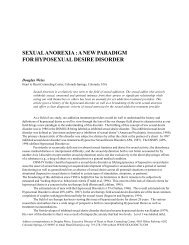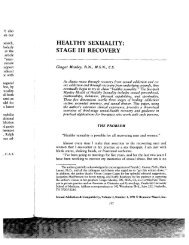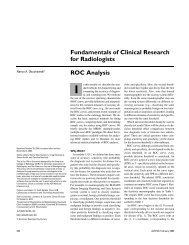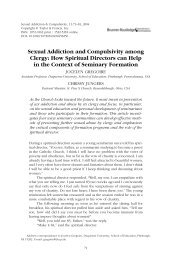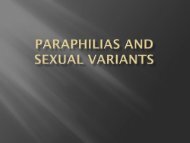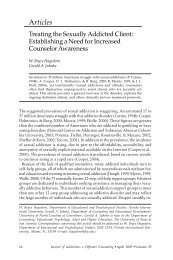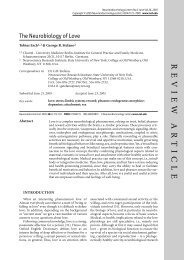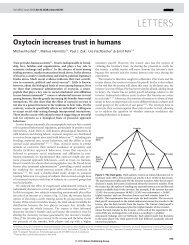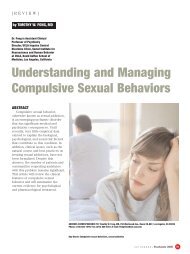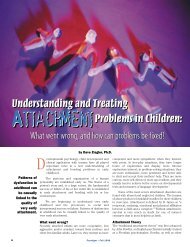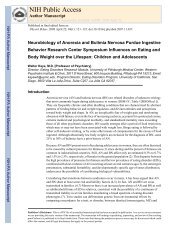An Overview of Psychiatric Ethics
An Overview of Psychiatric Ethics
An Overview of Psychiatric Ethics
You also want an ePaper? Increase the reach of your titles
YUMPU automatically turns print PDFs into web optimized ePapers that Google loves.
Normative Ethical Theories and Psychiatry1Applied to psychiatry, this process may be deployed to understand differences in how societiesapproach issues related to autonomy, such as involuntary treatment, psychiatric diagnosis, allocation<strong>of</strong> health care resources or forced breaches <strong>of</strong> confidentiality. Where this approach collapses is indefining what the basic goods <strong>of</strong> psychiatry are. The whole notion <strong>of</strong> good in ethics has provedelusive, and this is also the case in psychiatric ethics. G.E. Moore 26 recognised this in arguing for theintuitionist position that a moral good is a simple, non-natural, indefinable quality <strong>of</strong> certain things,such as interpersonal attachment or the aesthetic appreciation <strong>of</strong> beauty. Perhaps the only attemptto define a good in any bioethical context is Pellegrino’s assertion that the good in medicine is thegood <strong>of</strong> the patient. 163 Even here, how to define the good <strong>of</strong> the patient is slippery – Pellegrinopostulates the existence <strong>of</strong> biomedical, patient-defined, and human-defined conceptions <strong>of</strong> thegood.POST-MODERN PROFESSIONAL ETHICS<strong>Overview</strong>“Postmodernism” is a term variably used to describe any intellectual activity, from art to architecture,which appears to break with the rationalist traditions <strong>of</strong> the Enlightenment, or “modernism”.Jean-Francois Lyotard 164 summarized the core <strong>of</strong> postmodernism as being “incredulity tometanarratives”, or the rejection <strong>of</strong> grand, unified conceptual schemes. Psychiatry is argued tobe “a quintessentially modernist project” because <strong>of</strong> its embrace <strong>of</strong> scientific paradigms. 165 Thepostmodern approach to knowledge has been applied to psychiatry, 166 which argued that thingsare more complex than depicted in the modernist project <strong>of</strong> positivism (rejecting metaphysics) andempiricism (knowledge based upon observation and experience).Applied to ethics, Hugman argued that the postmodern approach seeks to move away fromoverarching theoretical structures into individualizing relationships which have virtues in thebackground. 167 Hugman nominates the work <strong>of</strong> MacIntyre, 77-79 Foucault 168 and Bauman 169 asbeing the key works in postmodern ethics applied to the helping pr<strong>of</strong>essions.27Bauman’s Post-Modern <strong>Ethics</strong>Like many postmodern theorists Zygmunt Bauman’s, intellectual position resulted from thedisillusionment with the horrors <strong>of</strong> the Twentieth Century. He was a Polish writer working in theshadow <strong>of</strong> the Holocaust and saw ethics as a process involving “a moral party <strong>of</strong> two (p.82)”. LikeMacIntyre, Bauman’s post modern approach to morality is his response to the failings <strong>of</strong> post-Enlightenment European moral philosophy. He saw the Holocaust as arising out <strong>of</strong> the ideas <strong>of</strong> suchphilosophy, in particular that <strong>of</strong> Hobbes. 170 Indeed, as MacIntyre points out, alá Arendt, Eichmannwas able to reconcile his crimes with his adherence to the deontic tradition <strong>of</strong> Kant. 82 As such,Bauman insisted that our moral responsibility cannot be reduced to the fulfillment <strong>of</strong> a limited set <strong>of</strong>socially constructed, arbitrary rules. He argues human morality can only be grounded in the “moralimpulse”.Bauman’s postmodernism was:“…modernity without illusions... (t)he illusions in question boil down to the beliefthat the “messiness” <strong>of</strong> the human world is but a temporary and repairable state,sooner or later to be replaced by the orderly and systematic rule <strong>of</strong> reason (p.32)” 169Bauman described the “aporetic” (confused or difficult to verify) nature <strong>of</strong> human relations and inthe face <strong>of</strong> this, he rejects the idea <strong>of</strong> a socially constructed morality. As such, Bauman was critical<strong>of</strong> bureaucracy and systems. Concerns about bureaucracy are not new. The Nineteenth Century171, 172sociologist Max Weber warned <strong>of</strong> the destructive effects <strong>of</strong> large bureaucratic institutions.Such institutions focused on outcomes, rather than values, and as such had lost touch with socialvalues. To Weber, individuals who were subject to the influence <strong>of</strong> bureaucracies were in an “ironcage” and that society had dipped into a “polar night <strong>of</strong> icy darkness”.Foucault’s Post-Modern <strong>Ethics</strong>Michel Foucault’s writings covered many aspects <strong>of</strong> knowledge and power. His oeuvre madefrequent reference to psychiatry. In the tradition <strong>of</strong> post-modernism, Foucault’s ethical projectrejected the notions <strong>of</strong> religious, scientific or conventional moral codes as being the basis <strong>of</strong> anyIMET AN OVERVIEW OF PSYCHIATRIC ETHICS



